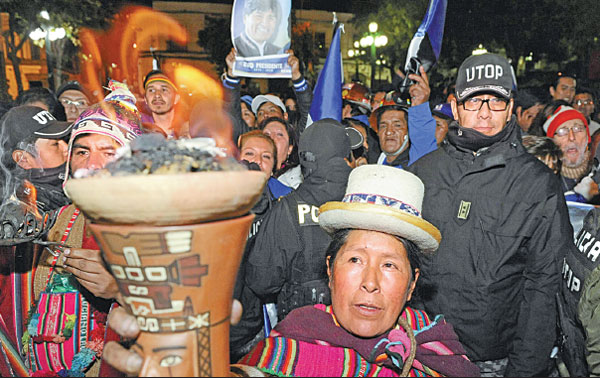Bolivia's Morales secures third term with landslide
President's party set to sweep the board in parliamentary elections
Bolivian President Evo Morales declared victory on Sunday, as exit polls showed him romping to a third term with more than 60 percent of the vote, giving him a strong mandate to expand his leftist reforms.
Thousands of people poured onto the streets of La Paz in celebration, flocking to the Presidential Palace to get a glimpse of the man they affectionately call "El Evo", Bolivia's first indigenous president. Large crowds also flooded the streets of other major Bolivian cities.
"This is the triumph of the anti-colonialists and anti-imperialists," boomed Morales, 54, who has aligned himself with Cuba, Venezuela and Iran, and has an antagonistic relationship with the United States.
Morales' Movement Toward Socialism was meanwhile on track to win 111 out of 130 seats in the Chamber of Deputies and 25 of the 36 seats up for grabs in the Senate, exit polls showed.
To roars of approval, Morales dedicated victory to former Cuban leader Fidel Castro, late Venezuelan president Hugo Chavez, and all "anti-imperialist and anti-capitalist" leaders.
Official results were delayed to early Monday, but pollsters Ipsos and Equipos Mori said Morales had triumphed a whopping 40 points ahead of his nearest rival, wealthy cement magnate Samuel Doria Medina.
Fast-growing economy
Morales will extend his time in office to 14 years, until January 2020, after Bolivia's Supreme Court ruled last year that his first term was exempt from a new Constitution adopted in 2009 that imposed a limit of one re-election for sitting presidents.
The fragmented opposition has accused him of trampling on democracy, clinging to power and failing to rein in crime, drug trafficking and corruption.
After rising to prominence as a union leader fighting for the rights of the country's coca growers, Morales has brought sweeping changes since taking office in 2006.
His government has nationalized a broad range of sectors, including oil, gas, mining, telecommunications and water; rolled out welfare grants for the elderly, children and expectant mothers; and moved to empower previously marginalized groups, among them the indigenous people who account for 65 percent of the population.
Defying opponents' dire warnings of economic catastrophe, Bolivia, one of the poorest countries in Latin America, has instead seen a boom.
The economy grew 6.8 percent last year and is forecast to grow more than 5 percent this year, one of the fastest rates in the region.
AFP - Xinhua
|
A Bolivian Aymara woman burns incense as thousands of supporters celebrate the re-election of Bolivia's President Evo Morales in Plaza Murillo across from the Presidential Palace in La Paz on Sunday.? Jorge Bernal / Agence France-Presse |
(China Daily 10/14/2014 page12)















